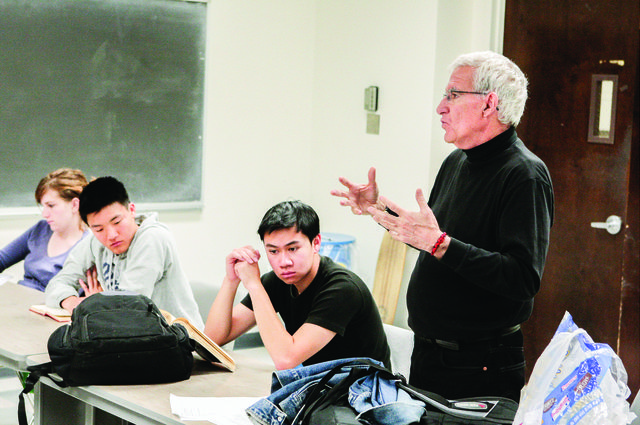Starting this winter and continuing through to UCLA’s centennial anniversary in 2019, freshmen will have a chance to dive into the university’s rich history through a series of Fiat Lux seminars designed to explore various aspects of the institution's founding and growth.
For the coming winter quarter, several faculty members have signed up to teach these special seminars, which will cover wide-ranging topics — from the humanities to social sciences — within the context of the university’s first 100 years.
Coordinated by the UCLA College’s Division of Undergraduate Education, the Fiat Lux Freshman Seminar Program provides students and faculty with small group settings to engage in meaningful discussions on many different subjects. The Fiat Lux program was first conceived in 2001 to give students an academic context for the events of Sept. 11. Since then, the seminars have evolved to cover a spectrum of topics. Students receive one unit of academic credit, and faculty members from across campus have the opportunity to share their intellectual passion and expertise in different areas with undergraduates.
|
Fiat Lux since 2001
|
|
|
40,754 enrolled (80 percent freshmen) 2,608 seminars 2,217 faculty members |
|
|
Past Fiat Lux seminars
|
|
|
“Secrets of the Northern Lights: Earth’s Aurora” Art + Science Dialogs “Making of Folk Hero in Hip-Hop Culture” “Love, Violence, and Courtliness in Medieval Romance and Epic” For a complete list, visit the Fiat Lux website. |
|
Past Fiat Lux courses have delved into such topics as “Meditation for College Students,” “Jack the Ripper: Unsolved Murders in Whitechapel,” “Parasites: Eating Us Alive” and “Boots to Bruins: From Combat to Campus Life.” For the centennial seminars, equally passionate and distinguished faculty members will teach seminars on a broad range of topics as they relate to UCLA and those who have contributed to the university’s success.
“When you look at all of the individuals who have really made our world a better place, from the students to the faculty to the alumni, UCLA has some significant people,” said Dean and Vice Provost of Undergraduate Education Patricia Turner, who first came up with the idea for the centennial seminars. “Over the past 100 years, we have had individuals of enormous impact who can do the eight-clap. These seminars will add another dimension to school spirit.”
Among the teachers of these seminars will be Turner herself, who is an expert on tennis legend and 1966 UCLA graduate Arthur Ashe. In 1975 Ashe made history as the first black tennis player to win the men’s title at Wimbledon. Turner’s seminar, “Arthur Ashe and the Second Half of the 20th Century,” will focus on the tennis player’s life and its parallel to events that shaped contemporary history.
“His life intersects several key moments of the second half of the 20th century,” Turner said. “Ashe came to UCLA with the backdrop of the civil rights movement and segregation, and later became involved in the anti-apartheid movement in South Africa and, of course, as an activist for HIV/AIDS awareness.”
Other centennial-focused seminars to be offered during winter quarter include “Los Angeles Architecture and Ethnicity,” taught by professor Teofilo Ruiz, distinguished professor of history with a joint appointment in the Department of Spanish and Portuguese, and “Exploring the Trees of UCLA,” taught by Victoria Sork, dean of UCLA Life Sciences and a professor in the Department of Ecology and Evolutionary Biology.
“The landscape of UCLA is part of its history,” Sork said. “The founders intended the campus to serve as an urban arboretum.”
Sork plans to explore various kinds of landscapes across UCLA with her class, including the Mildred E. Mathias Botanical Garden, home to more than 3,000 plant species, and the northwest corner of the 400-acre campus, where the original chaparral species that once covered the landscape a century ago still can be found.
Chancellor Gene Block, who regularly teaches Fiat Lux courses, will also participate in the centennial seminars.
UCLA’s centennial anniversary in 2019 will coincide with the end of a $4.2 billion fundraising campaign meant to carry the university into its second century. Turner has identified the Fiat Lux program as a campaign priority and hopes to secure a philanthropic endowment to ensure its future.
“I can think of no more fitting time to invite the faculty to develop and teach under the UCLA Centennial Seminar banner,” Turner said.
This story appeared originally in the UCLA College Report.





